Turritellidae
Appearance
(Redirected from Pareorinae)
| Turritellidae | |
|---|---|
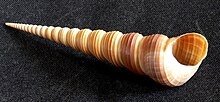
| |
| A shell of a Turritella species | |
| Scientific classification | |
| Domain: | Eukaryota |
| Kingdom: | Animalia |
| Phylum: | Mollusca |
| Class: | Gastropoda |
| Subclass: | Caenogastropoda |
| Superfamily: | Cerithioidea |
| Family: | Turritellidae Lovén, 1847 |
| Genera | |
|
See text | |
| Diversity | |
| 26 extant genera 143 extant species | |
| Synonyms | |
| |
Turritellidae, with the common name "tower shells" or "tower snails", is a taxonomic family of small- to medium-sized sea snails, marine gastropod molluscs in the Sorbeoconcha clade.
They are filter feeders; this method of feeding is somewhat unusual among gastropod mollusks, but is very common in bivalves.
Shell description
[edit]The shells of turritellid species have whorls that are more convex and their apertures being more circular than it is in the auger shells, which are similarly high-spired. The columella is curved and the thin operculum has many horns.
Anatomy of the soft parts
[edit]These snails burrow into mud or sand, with their feet being relatively small.
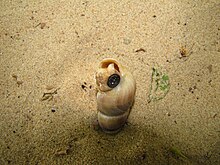
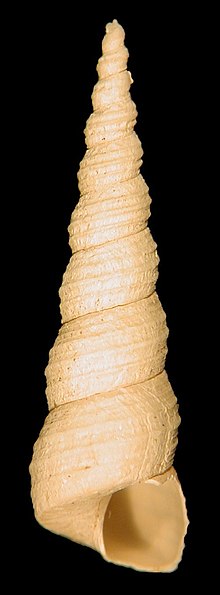
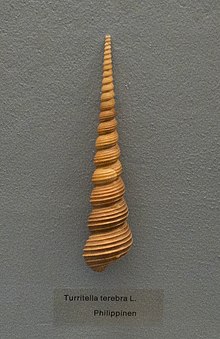
Taxonomy
[edit]The following genera are recognised in the family Turritellidae:[1]
- †Omalaxinae
- †Omalaxis Deshayes, 1832
- Orectospirinae
- Orectospira Dall, 1925
- Pareorinae
- †Batillona Finlay, 1927
- †Eligmostoma Cossmann, 1888
- Mesalia Gray, 1847
- Pareora Marwick, 1931
- †Sigmesalia H. J. Finlay & Marwick, 1937
- Protominae
- Turritellinae
- Archimediella Sacco, 1895
- Armatus A. N. Golikov, 1986
- †Asiella Kryachkova, 1969
- Banzarecolpus A. W. B. Powell, 1957
- Broderiptella Olsson, 1964
- Callostracum E. A. Smith, 1909
- †Calvertitella Petuch, 1988
- Caviturritella Friend & B. M. Anderson, 2023
- †Colposigma H. J. Finlay & Marwick, 1937
- Colpospira J. Donald, 1900
- †Costacolpus Marwick, 1966
- †Cristispira Allison, 1965
- Gazameda Iredale, 1924
- Haustator Montfort, 1810
- Helminthia Handmann, 1882
- Incatella DeVries, 2007
- †Kapalmerella Allmon, 2005
- Maoricolpus H. J. Finlay, 1926
- †Mariacolpus Petuch, 1988
- †Nairiella Hacobjan, 1969
- Neohaustator Ida, 1952
- †Nodosella Hacobjan, 1969
- †Oligodia Handmann, 1882
- †Peyrotia Cossmann, 1912
- †Ptychidia Handmann, 1882
- †Roamerella S. K. Donovan & van den Hoek Ostende, 2013
- †Spirocolpus H. J. Finlay, 1926
- Stiracolpus H. J. Finlay, 1926
- †Tachyrhinchella Titova, 1994
- Tachyrhynchus Mörch, 1868
- Torcula J. E. Gray, 1847
- †Torquesia H. Douvillé, 1929
- †Torquesiella Pchelintsev, 1969
- Tropicolpus Marwick, 1931
- Turritella Lamarck, 1799 - the type genus of the family
- Turritellinella Harzhauser & Landau, 2019
- Vermicularia Lamarck, 1799
- †Viennella Harzhauser & Landau, 2019
- Zeacolpus H. J. Finlay, 1926
- Other
- †Arcotia Stoliczka, 1867
- †Leptocolpus H. J. Finlay & Marwick, 1937
Palaeontological locations
[edit]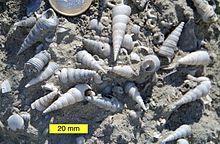
- The Turritellenplatte of Ermingen ("Erminger Turritellenplatte" near Ulm, Germany) is situated in the northern part of the North Alpine Foreland Basin (NAFB) and is of interest for its abundance of Turritella turris gastropod shells within sedimentary deposits. The fauna of the gastropod-rich sandstone reflects mainly towards near-coastal and shallow marine conditions.[2] Petrographical and palaeontological data allow for a correlation with this area and the Burdigalian age (Lower Miocene epoch). Based on the Sr-isotope composition of shark teeth in the area, the age of the area is about 18,5 Ma.[3]
References
[edit]- ^ "WoRMS - World Register of Marine Species - Turritellidae Lovén, 1847". www.marinespecies.org. Retrieved 2024-04-23.
- ^ Baier J. (2008). "Über die Tertiärbildungen im Ulmer Raum". Documenta Naturae 168: 1-32. München. ISBN 978-3-86544-168-3.
- ^ Baier J. (2008). "Ein Beitrag zur Erminger Turritellenplatte (Mittlere Schwäbische Alb, SW-Deutschland)". Jahresbericht Mitt. oberrhein. geol. Ver., N.F. 90: 9-17. Stuttgart, ISSN 0078-2947.
Further reading
[edit]- Mayr H. (1985). A Guide to Fossils. Princeton University Press, Princeton, New Jersey, USA. (English translation 1992).
- Powell A. W. B. (1979). New Zealand Mollusca, William Collins Publishers Ltd, Auckland, New Zealand, ISBN 0-00-216906-1.
- Kiel S. (2003) New taxonomic data for the gastropod fauna of the Umzamba Formation (Santonian–Campanian, South Africa); Cretaceous Research 24 (2003) 449–475
External links
[edit]Wikimedia Commons has media related to Turritellidae.
- "Turritellidae". Integrated Taxonomic Information System.
- Selachian fauna of Turritellenplatte: Abstract of Baier et al. 2004
- Age and Sedimentpetrography of Turritellenplatte: Abstract of Baier 2008
- Turritelidae species database
- Miocene Gastropods and Biostratigraphy of the Kern River Area, California; United States Geological Survey Professional Paper 642
 This article incorporates text from this source, which is in the public domain.
This article incorporates text from this source, which is in the public domain.
